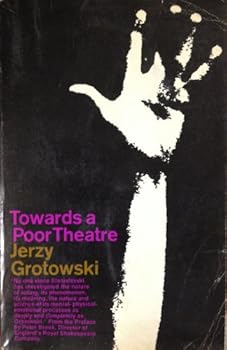Towards a Poor Theatre
Select Format
Select Condition 
Book Overview
Jerzy Grotowski created the Theatre Laboratory in 1959 in Opole in south-west Poland. His work since then, with a small permanent company, has become a source of interest to many modern directors.... This description may be from another edition of this product.
Format:Paperback
Language:English
ISBN:0671204149
ISBN13:9780671204143
Release Date:April 1970
Publisher:Touchstone
Length:262 Pages
Weight:0.68 lbs.
Customer Reviews
5 ratings
Wonderful Book
Published by Thriftbooks.com User , 15 years ago
Every actor and theatre professional in the world should read this book at least three times. It is fantastic, mindblowing and (at least to me) life changing.
Required Reading
Published by Thriftbooks.com User , 17 years ago
For any theatre professional, student or enthusiast. Highly recommend watching "My Dinner With Andre" as well. It's a film by Wallace Shawn.
Beauty in Poverty and Performance
Published by Thriftbooks.com User , 22 years ago
Comprehending this book is no small feat. Sure, you start with the premise that competing with the technical spectacle of movies and TV is a fruitless pursuit. That's not difficult. Neither is the idea of embracing poverty in theatre and making the human being the only center of performance. That's dead easy. Spare costumes, little or no makeup, no sound effects, as few light effects as possible. Who can argue with that?But this doesn't mean everybody can embrace Grotowski's vision of Poor Theatre. His is one that involves stripping away all preconceived notions of theatre from the early Modern period on. This will never fly in commercial theatre, dependent as it is on technology, nor will it satisfy many recent playwrights, who depend on technical do-funnies to make their shows work.Grotowski also takes a funny view of plays, playwrights, and theoreticians who don't agree with him. Among other things, he considers playwrights as hired talent and plays as essentially malleable. He also suggests that the only way the writings of Artaud are useful in theatre is if they are taken elementally rather than globally - a position sure not to sit well with many avant-garde directors.Because this book isn't a straight-ahead statement of principles, ideas, and practices, it yields its secrets only with difficulty. Parts of it aren't even written by Grotowski, but are interviews by other authors, or even observations that don't include quotes from the man himself. It was basically compiled to provide an overview of the ideas and products of the Polish Laboratory Theatre up to that time, and it encourages experiment and development by the reader.This isn't to say that it isn't actually useful. There are exercises for actors; there are statements of theory for directors; there are even sketches, diagrams, and photos for designers. However, expect to wrestle with this book if you're going to unlock its secrets. Once you elect to start down this path, you have a long row to hoe
It is a crime this book is out of print.
Published by Thriftbooks.com User , 23 years ago
"Towards A Poor Theatre" by Jerzy Grotowski is probably the most important book written on acting since Stainslavsky's three famous character books. There is so little known about Grotowski and many people have tried to fake his work and people need to read the man's original words. Grotowski's vision of theatre has had the greatest effect on me more than any other person in theatre. He saw acting as a Holy experience where both the actor and spectator were transformed after the performance. Grotowski expanded from where Stainslavsky left off and drew his ideas everywhere from modern art to religious rituals to primitive theatre. Any one interested in theatre must read this book somehow and be changed forever like I have.
A Classic
Published by Thriftbooks.com User , 23 years ago
There is no better book that I have read on the theory and practice of theatre. As Peter Brook says in the preface, "Grotowski is unique. Why? Because no-one else in the world, to my knowledge, no-one since Stanislavsky, has investigated the nature of acting, its phenomenon, its meaning, the nature and science of its mental-physical-emotional processes as deeply and completely as Grotowski."Grotowski argues effectively that the split of the stage and the screen necessitates that the stage redefine its focus. The screen with its higher budget and countless retakes will always beat the stage in richness. So, Grotowski posits "If it [the stage] cannot be richer than the cinema, then let it be poor." The rest of the book illustrates what such a poor theatre means in practice. Brilliant.





